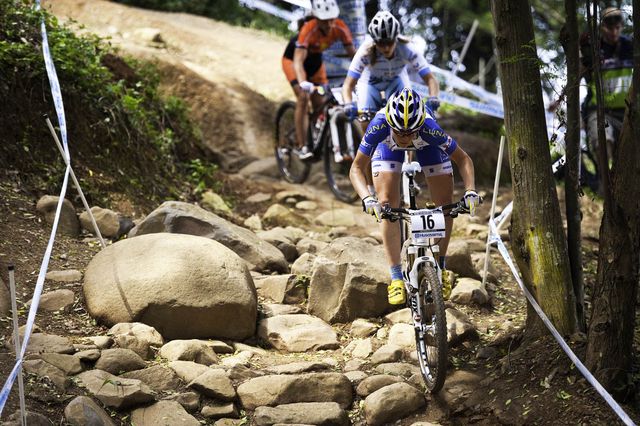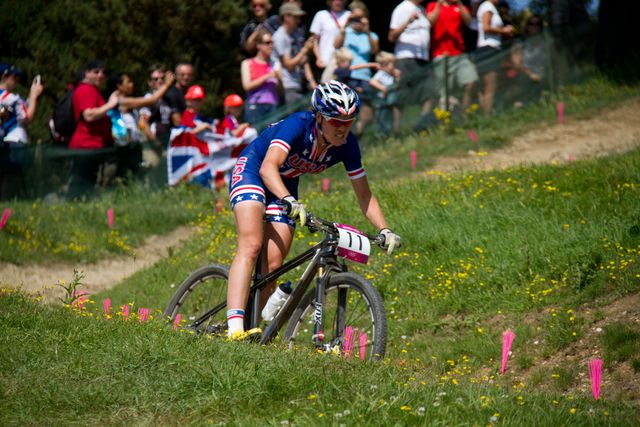
When Georgia Gould, 32, in mountain biking at the London Olympics last month, many Americans scratched their heads and said, “Who?” That has more to do with public ignorance of women's cycling than it does with Gould, who has been a mainstay on the race circuit since she began competing in 2005. She is a four-time national cross country champion, has finished on the national championship podium every year since 2006, and has had some very close calls on the World Cup. 's no slouch on a cross bike either, with three U.S. Gran Prix of Cyclocross titles to her name.
This year, though, has been a breakout season for the racer as she's chalked up the biggest wins of her career, including two second places in the World Cup and, of course, third at the Olympics. She's hoping to put that good form to use this weekend at the World Championship cross-country race in Saalfelden, Austria. She took a few minutes out of her pre-race schedule in Europe to speak with us about her successful year, the state of women's cycling, and her chances on Saturday.
Congrats on your bronze medal. Did the result come as a surprise?
I wasn't surprised, but I was
really excited to have been able to do it that day. I have known for a few
years that I am capable of winning a big international race—it's just a
question of putting all the pieces together on race day.
Tell us about the race?
My race started really poorly. I
lined up on the wrong side, got squeezed out in the first corner, and found
myself riding in the 20s after one minute of racing. I kind of saw my Olympic
dream sliding away. But from the all the things I've seen happen in a race over the years, I knew that anything can happen. So I just tried to
pass as many people as possible. I was so excited when I made it to the front group,
but I had used up a bunch of energy so I was trying to sit in and conserve a
bit. On one of the rocky downhills, I was in third and the woman in front, Sabine Spitz of Germany, crashed. That allowed France's Julie Bresset, who eventually won the race, to get
away, while Sabine and I had to run the downhill before getting back on our
bikes. I think I was riding stronger than Sabine, but I wasn't taking any risks on the downhills. In the last two laps my mentality switched to maintaining my position. Fourth place wasn't far
behind, and like I said before, anything can happen. Crossing the finish line
was an amazing and surreal feeling. It's what I had hoped for going in, but to be able to
pull it off that day…. Wow!
The course looked a little
strange on TV. Did you like it?
I thought they did a great job with
the course. It was very open and great for spectators and TV. The rock
obstacles they built were challenging and cool to watch, the course had plenty
of passing areas, and the climbs and descents were
all pretty short, which meant the field didn't string out as much as usual. It made for a fast and exciting race.
You've had
some bad luck in derail races in the past, like the in New York.
Earlier this year, I was leading a
the World Cup race in by one minute. It would have been my first World Cup win, and with two laps to go my legs started cramping. I had to ease off a little bit, but I
hoped I might be able to hang on for the win. Unfortunately, I was passed in
the last half of the last lap (less than 10 minutes from the finish).
I was
disappointed, but I knew I had good fitness so I was ready to race again at the
world Cup the next weekend in Windham, New York. Again, I was leading the race by one minute,
and I got a flat tire half a mile from the finish on a long downhill. I
had to get off and run a short uphill to the finish line, and I ended up
getting passed about 30 yards from the finish. I was very disappointed again,
but I really tried to take away some positives. Hey, I'm riding fast
enough to win a World Cup—that's awesome!

Mentally, is it tough to bounce
back from experiences like that?
For me, no. It actually made me more
motivated, because I knew I could do it. It did make me more cautious though. In the last two laps of the Olympic race, I kept thinking “something is going
to happen … where's it going to happen….”
There's a public and media
prejudice given to men's cycling over women's, and yet women were the only
American cyclists to walk away from the Olympics with medals. Has this improved
the stature of women's racing?
I think mountain bike racing is pretty equal. Right now, the women's field is so competitive—on any given day there are
probably about 10 riders who can challenge for the win. That makes the racing
more exciting to watch.
It hearkens back to the effort you made in 2007, when you spearheaded a petition to get the UCI to institute equal pay among men and women cyclists.
And there's been similar talk .
The biggest thing to come out
of my petition was awareness: There were a lot of women (and men) that didn't
know the disparity was that big. In some cyclocross races, the men's winner
would get roughly 10 times what the women's winner got. Once people knew about
that, we saw a lot of U.S. race promoters step up and voluntarily offer equal prize
money to the top men and women. It was great to see the support for U.S. women's
racing, especially since the U.S. has some of the best women in the world!
Are there lessons for women's cycling from, say, women's soccer, which has had a tremendous amount of support
and success?
I think that as a sport we can
learn a lot from lots of other sports. One thing that has started to happen is
the development of mountain bike leagues. This has been and will
continue to be a great way to recognize and develop young talent, and I think
you will see more world class riders coming out of the U.S. in the next few
years.
You are racing the World Championships this
weekend in Saalfelden, Austria. How does the venue look?
The course is really good. There
are two major climbs and two major descents, with a few man-made obstacles and the standard rock-drop stuff. There's a good mix of technical sections
(with roots and rocks) and faster, more open sections with plenty of space for passing. It's a worthy course.
How does the World Championship
race compare to the Olympics for you?
The world championships is always a
huge goal for me. I mean, who doesn't want to be champion of the whole world?
Even though we get to race world's every year (instead of every four like the
Olympics), it is still a really big goal. My preparation has been very similar—I'm just sticking to what has worked for me.
How do you rate your chances
tomorrow?
I have prepared really well for
this race, and I am feeling good, so hopefully that will be enough. You never
know until you get in the race though, and there are lots of women who are as
hungry as I am for that title.
Good luck!
—Aaron Gulley